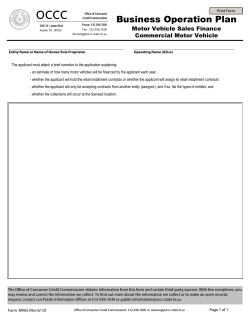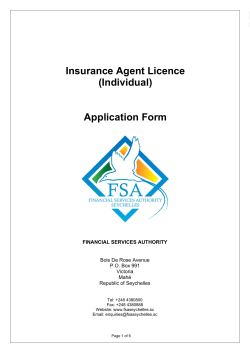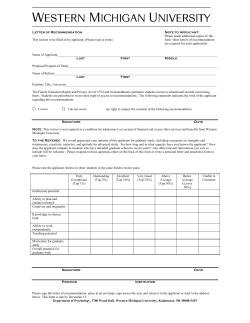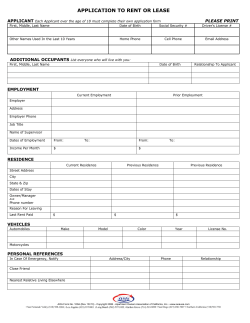
Document 181092
HOW TO BECOME A Professional Electrical Engineer Board of Electrical Engineering Professional Regulation Commission FORTUNATO C. LEYNES, MBA, FIIEE Chairman JAIME V. MENDOZA, MTM, SMIIEE Member FRANCIS V. MAPILE, BBM, FIIEE Member Qualifications for Registration as Professional Electrical Engineer (RA 7920 Art. III, Sec. 16) citizen of the Philippines; of good reputation with high moral values; has not been finally convicted by the court of an offense involving moral turpitude; holder of the degree of Bachelor of Science in Electrical Engineering (BSEE) from a university, school, college, academy or institute duly constituted, recognized and accredited by the Philippine government; and, a registered electrical engineer with valid certificate of registration and professional license and with four (4) years or more of active practice reckoned from the date of his registration as a registered electrical engineer. Practice of Electrical Engineering (RA 7920 Art. I, Sec. 2a) 1. 2. 3. Consultation, investigation, valuation and management of services requiring electrical engineering knowledge; Design and preparation of plans, specifications and estimates for electric power systems, power plants, power distribution system including power transformers, transmission lines and network protection, switchgear, building wiring, electrical machines, equipment and others; Supervision of erection, installation, testing and commissioning of power plants, substation, transmission lines, industrial plants and others; Practice of Electrical Engineering (RA 7920 Art. I, Sec. 2a) 4. 5. 6. 7. Supervision of operation and maintenance of electrical equipment in power plants, industrial plants, watercrafts, electric locomotives and others; Supervision on the manufacture and repair of electrical equipment including switchboards, transformers, generators, motors, apparatus and others; Teaching of electrical engineering professional subject; and Taking charge of the sale and distribution of electrical equipment and systems requiring engineering calculations or applications of engineering data. Requirements for Registration as Professional Electrical Engineer (Rule 14, IRR RA 7920) 1. PRC Application Form (PRC Form No. 101) 2. Permanent Registration Record Card (PRC Form No. 203) 3. Proof of Philippine Citizenship, e.g., Certificate of Naturalization, Voter’s affidavit/ID Card, Philippine Passport/Visa 4. Certificate of Live Birth and/or marriage contract (if applicant is a married female) 5. NBI clearance 6. Valid Certificate of Registration and a Valid Professional License as a Registered Electrical Engineer. 7. Certificate of Experience PRC Form No. 104 (Revised August ‘95) duly accomplished and certified under oath. This service record shall be reckoned from the date the applicant took oath as an REE (or ASSO EE or ASST EE). Requirements for Registration as Professional Electrical Engineer (Rule 14, IRR RA 7920) 8. Technical Report/Thesis/Dissertation Paper 9. Affidavits signed by three licensed professional electrical engineers to the effect that the experience record submitted by the applicant is factual and that the technical paper submitted was actually and solely prepared by the applicant. 10.Brief description of the most significant and outstanding achievement/contribution of the applicant in the field of electrical engineering. The interview shall be scheduled as often as required throughout the year, and may be held at the head office in Manila or in the PRC Regional offices when the number of applicants for PEE would justify the funds requirement for at least two members of the Board to conduct the interview/oral examination. Technical Report “Technical paper covering an evaluation, an analysis or a critical discussion of an electrical engineering project or subject, on one or several technical aspects such as: design, construction, installation, commissioning, testing, operation, maintenance, repair, research and the like. The technical paper shall be supported by engineering principles and data. Published or unpublished scientific paper or treatise on electrical engineering theories and applications may be considered as complying with the requirement;” Topics can be: post-projects, on-going projects, proposed projects, thesis Elements of the Technical Report (Rule 14, IRR RA 7920) Title Page Letter of Transmittal Preface Table of Contents List of tables, charts, drawings etc. Summary Body Text Conclusions/Recommendations Bibliography/References Affidavit of sole authorship Affidavit of PEE 1 Affidavit of PEE 2 Affidavit of PEE 3 Curriculum Vitae (with ID picture) STEPS TO FOLLOW WHEN APPLYING FOR PEE EXAMS 1. Submit a proposed title & outline with synopsis for each chapter to the Board of EE for approval as to subject matter, organization, technical content and presentation. If disapproved, the Board shall advise the applicant citing the reasons therefore. PEE applicant shall include an e-mail address in his/her bio-data that comes with the submission of the proposed title PEE applicant will be required to come in person for screening of the proposed topic by at least two members of the Board of EE PEE applicant will be required during the screening to bring the original copy of the Certification from the three PEEs who will execute affidavits vouching the applicant’s experience and providing advise during the preparation of the technical engineering report and proof of active involvement in IIEE and/or community and original copy of the Certificate of Employment/Service Record Date and venue for the screening will given in the reply letter to the applicant Sample of Outline with Synopsis Chapter 1.0 Introduction Synopsis: This section describes the location and description of the propose project. In this part, the objective of the project is defined and will provide brief summary of scope of design. 1.1 Project Description 1.2 Project Objective 1.3 Project Summary Sample of Outline with Synopsis Chapter 2.0 Electrical Design Criteria Synopsis: As a basis of this design report, applicable requirements of the applicable codes, specifications, regulations, and standards will be described in this section. Design requirement of over 600V: medium voltage 6.6 kV will be considered in the electrical system of pumps with motors rated 300 hp to 3000 hp. 2.1 Basic Design Codes 2.2 Equipment for General Use & Special Systems 2.3 System Frequency, Voltage and Voltage Drops 2.4 System Studies and Design Assumptions 2.5 Environmental Conditions Sample of Outline with Synopsis Chapter 3.0 Electrical Calculations Synopsis: The determination of the proper calculation for the following: transformer loads, primary and secondary (medium voltage 6.6 kV) feeder conductor size of the transformer, main distribution and feeder circuit conductor size, circuit breaker rating, voltage drop, short circuit calculations, capacitor power factor correction calculation, grounding calculation, emergency standby generator rating, etc. 3.1 Mains Primary and Secondary (Medium Voltage 6.6kV) Feeder Cable Size Calculation 3.2 Medium Voltage Load Calculation 3.3 Short Circuit Calculation 3.4 Small Power Low Voltage Load Calculation 3.5 Voltage Drop Calculation 3.6 Capacitor Power Factor Correction Calculation 3.7 Grounding Calculation 3.8 Emergency Standby Generator STEPS TO FOLLOW WHEN APPLYING FOR PEE EXAMS 2. After approval of the proposed title and outline by the Board, submit all requirements for processing together with the five (5) copies of the Technical Report. Four (4) which will be retained by the Commission and one (1) by the applicant stamped with “RECEIVED COPY”. The applicant will be required to submit the Technical Report within six (6) months from the oral screening 3. Payment of P600.00 for the examination fee. ANY APPLICANT WHO FAILED IN THE ORAL EXAMINATION/INTERVIEW SHALL NOT RE-APPLY AFTER AT LEAST ONE (1) YEAR FROM THE DATE OF NOTICE OF FAILURE. IN THE RE-APPLICATION, RULE 14 SHALL BE OBSERVED!!! Do’s and Don’ts TITLE OF THE REPORT SHOULD BE IMPRESSIVE OR SHOULD SPEAK FOR ITSELF Prepare at least three (3) topics PROPOSED OUTLINE SHALL INCLUDE SYNOPSIS FOR EACH CHAPTER TECHNICAL REPORT SHALL INVOLVE SUBSTANTIAL CALCULATIONS, e.g., Load calculations/load schedules/lay-out plans Transformer size determination Wire/feeder conductor size determination Circuit breaker/fuse rating determination Short circuit calculations Protection coordination Insulation coordination etc. SAMPLE TITLES Proposed 10 MVA Substation at La Castellana System Fault Analysis of Cemex-Apo Cement Corporation Electrical System Design for Administration Building of Mactan International Airport Electrical System Design of A Furniture Manufacturing Plant Do’s and Don’ts PURELY NARRATIVE REPORT IS NOT ACCEPTABLE AVOID UNNECESSARY AND IRRELEVANT DATA INCLUDING FIGURES/CHARTS/TABLES NOT REFERRED TO IN THE DISCUSSIONS Attach single line diagrams only that will be used in the discussions Specify references/sources of tables/graphs/charts AVOID PLAGIARISM If an author has written something particularly well, or their own words are for some reason significant, then put their words in quotes and give an appropriate citation Provide complete references to all works used, and cite these in the document where you use this information, USE FOOTNOTES, IF NECESSARY Do’s and Don’ts FOR NUMBERS LESS THAN 10, SPELL IT OUT, UNLESS THEY ARE MEASUREMENTS (AND UNITS, IF ANY, MUST BE SPECIFIED) USE A CONSISTENT FORMAT FOR UNITS do not randomly use “V,” “Volts,” and “volts” in the document SPECIFY THE UNITS WHEN NECESSARY AND BE AWARE OF THE CORRECT ABBREVIATION kW for kilowatt, not KW nor Kw kV for kilovolts, not KV nor Kv kVAr for kilovolt-ampere reactive, not KVAR nor kVAR MVA for megavolt-ampere, not Mva nor mVA nor mVa GWh for gigawatthour, not GWH nor gWh MWh for megawatthour, not MWH nor mWh Do’s and Don’ts SUFFICIENT KNOWLEDGE IN PEC 1 & 2 AND SHORT CIRCUIT CALCULATIONS IS REQUIRED PROOFREAD YOUR WORK! NOTHING LOOKS LESS PROFESSIONAL THAN A DOCUMENT FILLED WITH SPELLING ERRORS, MISSING WORDS, SENTENCE FRAGMENTS, MISSING FIGURES, ETC. Make sure of the correct page layout/sequence prior to bookbinding STRICTLY COMPLY WITH THE PRESCRIBED FORMAT MAKE THE NUMBER OF PAGES OF THE TECHNICAL REPORT THE LEAST AS POSSIBLE (THE BOARD IS NOT IMPRESSED WITH A VERY THICK REPORT) TECHNICAL REPORT SHALL BE PRINTED ON SIZE A4 SUBSTANCE 24 (90 gsm) WHITE BOND PAPER Use Verdana Font 12 (except for Tables/Attachments) Use 1.5 line spacing Do’s and Don’ts THE EXAMINEE SHALL SUBMIT FIVE (5) SETS OF THE TECHNICAL REPORT (within six (6) months from approval) Four (4) sets to be retained by the PRC/BEE One (1) set to be returned to the applicant stamped as “RECEIVED COPY” THE EXAMINEE SHALL ALSO SUBMIT A PDF COPY OF THE COMPLETE TECHNICAL REPORT (INCLUDING ATTACHMENTS SUCH AS GRAPHS, TABLES, DIAGRAMS, ETC.) SAVED IN A USB FLASH DISK USE OF POWERPOINT PRESENTATION DURING THE ORAL EXAMINATION IS NOT ALLOWED EXCEPT WHEN TO SHOW GRAPHS/CHARTS/FIGURES/DIAGRAMS Examinee shall provide the laptop computer and multimedia projector Criteria for Grading EXPERIENCE (30% ) Number of years of EE practice In excess of 20 years 11 to 20 years 5 to 10 years - 41 – 50% - 36 – 40% - 30 – 35% Exposure to various fields: Technical demands of those fields: - 50% - 30% - 20% ENGINEERING REPORT (30% ) Compliance to instructions Technical Content and Discussions Organization of Presentation Soundness of Conclusions & Recommendations Grammar, Spelling, etc. - 10% - 50% - 20% - 10% - 10% INTERVIEW (40% ) Punctuality at appointed time Grasp of Subject Matter Accuracy in answering technical questions Composure and confidence Verbal facility - 10% - 40% - 30% - 10% - 10% Criteria for Grading EXPERIENCE (30% ) Number of years of EE practice In excess of 20 years 11 to 20 years 5 to 10 years - 41 – 50% - 36 – 40% - 30 – 35% Exposure to various fields: Technical demands of those fields: - 50% - 30% - 20% ENGINEERING REPORT (30% ) Compliance to instructions Technical Content and Discussions Organization of Presentation Soundness of Conclusions & Recommendations Grammar, Spelling, etc. - 10% - 50% - 20% - 10% - 10% INTERVIEW (40% ) Punctuality at appointed time Grasp of Subject Matter Accuracy in answering technical questions Composure and confidence Verbal facility - 10% - 40% - 30% - 10% - 10% Q&A Send your questions/inquiries at these e-mail addresses: fcleynes@gmail.com fc.leynes@yahoo.com jaimevmendoza@gmail.com fvm.inc@gmail.com fvmassociates@yahoo.com.ph HOW TO BECOME A Professional Electrical Engineer Board of Electrical Engineering Professional Regulation Commission FORTUNATO C. LEYNES, MBA, FIIEE Chairman JAIME V. MENDOZA, MTM, SMIIEE Member FRANCIS V. MAPILE, BBM, FIIEE Member HYPERLINKS (FORMS) PRC Form 101 PRC Form 203 PRC Form 203 (back page) PRC Form 104 Curriculum Vitae Format for the Technical Report Title Page Letter of Transmittal Preface Table of Contents List of tables, charts, drawings etc. Summary Body Text Conclusions/Recommendations Bibliography/References Affidavit of sole authorship Affidavit of PEE 1 Affidavit of PEE 2 Affidavit of PEE 3 Curriculum Vitae (with ID picture) APPLICATION FLOWCHART APPLICATION FLOWCHART 1 PREPARE TECHNICAL ENGINEERING REPORT AND SUBMIT WITHIN SIX (6) MONTHS SUBMIT APPLICATION TO PRC TOGETHER WITH ENGINEERING REPORT COMPLETE WITH ALL ATTACHMENTS REGISTRATION AS PROF. ELECTRICAL ENGR ORAL EXAMINATION Y PASS ORAL EXAM? N END WAIT ONE (1) YEAR 2
© Copyright 2025










